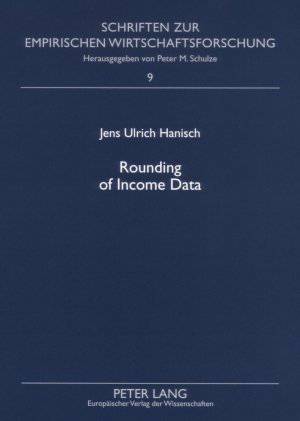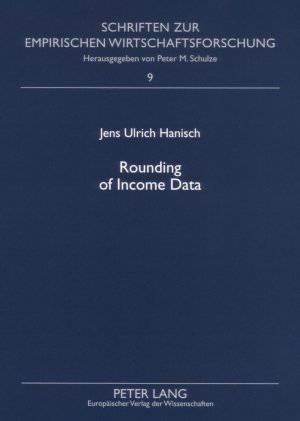
- Afhalen na 1 uur in een winkel met voorraad
- Gratis thuislevering in België vanaf € 30
- Ruim aanbod met 7 miljoen producten
- Afhalen na 1 uur in een winkel met voorraad
- Gratis thuislevering in België vanaf € 30
- Ruim aanbod met 7 miljoen producten
Rounding of Income Data
An Empirical Analysis of the Quality of Income Data with Respect to Rounded Values and Income Brackets with Data from the European Community Household Panel
Jens Ulrich Hanisch
€ 68,45
+ 136 punten
Omschrijving
Income questions are frequently answered with rounded values or income brackets. This has an impact on the quality of data, which is demonstrated for the European Community Household Panel (ECHP) and the German Socio-Economic Panel (SOEP). A matching of register and interview data for the Finnish sub-sample of the ECHP allows an analysis of the measurement error caused by rounding with regard to cross-sectional statistics and the mobility of incomes. The emphasis is on income quantiles, poverty measures and income mobility. The finding is that most income values are rounded after one or two significant digits, and the accuracy improves only slightly after the initial wave. The results are that rounding behaviour can change across panel waves, and can also be different across countries and types of income. Characteristics like gender, job type and mode of interview were significantly correlated with rounding behaviour.
Specificaties
Betrokkenen
- Auteur(s):
- Uitgeverij:
Inhoud
- Aantal bladzijden:
- 245
- Taal:
- Engels
- Reeks:
- Reeksnummer:
- nr. 9
Eigenschappen
- Productcode (EAN):
- 9783631556870
- Verschijningsdatum:
- 10/11/2006
- Uitvoering:
- Paperback
- Formaat:
- Trade paperback (VS)
- Afmetingen:
- 148 mm x 210 mm
- Gewicht:
- 359 g

Alleen bij Standaard Boekhandel
+ 136 punten op je klantenkaart van Standaard Boekhandel
Beoordelingen
We publiceren alleen reviews die voldoen aan de voorwaarden voor reviews. Bekijk onze voorwaarden voor reviews.










